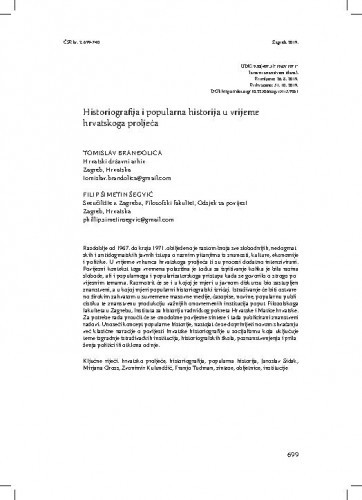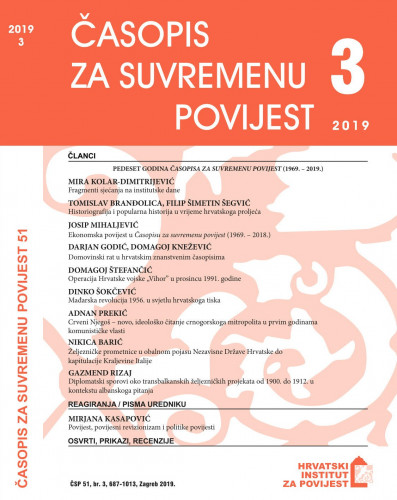Razdoblje od 1967. do kraja 1971. obilježeno je rastom broja sve slobodnijih, nedogmatskih i antidogmatskih javnih istupa o raznim pitanjima iz znanosti, kulture, ekonomije i politike. U vrijeme vrhunca hrvatskoga proljeća ti su procesi dodatno intenzivirani. Povijesni kontekst toga vremena polazišna je točka za ispitivanje kolika je bila razina slobode, ali i popularnoga i popularizatorskoga pristupa kada se govorilo o strogo povijesnim temama. Razmotrit će se i u kojoj je mjeri u javnom diskursu bio zastupljen znanstveni, a u kojoj mjeri popularni historiografski izričaj. Istraživanje će biti ostvareno širokim zahvatom u suvremene masovne medije, časopise, novine, popularnu publicistiku te znanstvenu produkciju važnijih onovremenih institucija poput Filozofskoga fakulteta u Zagrebu, Instituta za historiju radničkog pokreta Hrvatske i Matice hrvatske. Za potrebe rada proučit će se onodobne povijesne sinteze i tada publicirani znanstveni radovi. Unoseći koncept popularne historije, nastojat će se doprinijeti novom shvaćanju već klasične naracije o povijesti hrvatske historiografije u socijalizmu koja uključuje teme izgradnje istraživačkih institucija, historiografskih škola, poznanstvenjenja i prilaženja politici ili otklona od nje.; The time from 1967 to 1971 was marked by a rise in free, non-dogmatic, and anti-dogmatic public manifestations in various fields of science, culture, economics, and politics. At the high point of the Croatian Spring movement, these processes were highly intensified through the public voicing of expectations and thoughts on the necessity for change in historiography and the contemporary humanities and social sciences in general. The historical context of the times will serve as a starting point for examining the level of freedom as well as the prevalence of popular and popularizing approaches to historical topics. The levels of scholarly versus popular discourse in the writing of historical works will also be looked into. Defining popular history as a specific historiographical genre, we shall delve into a wide swathe of contemporary mass media, journals, magazines, newspapers, and popular non-fiction as well as scholarly works of some of the more important institutions of the times: the Faculty of Humanities and Social Sciences in Zagreb, the Croatian Institute of the History of the Workers’ Movement, and the Matica hrvatska cultural institution. Contemporaneous syntheses of Croatian history will also be explored. Looking into the main individuals (such as Jaroslav Šidak, the doyen of Croatian historiography, the dissenting public intellectual and historian Franjo Tuđman, the non-fiction writer Zvonimir Kulundžić, and other scholars), institutions, and anniversaries that marked the times, alongside the approach of popular history, a new contribution can be given to the classical narration on the history of Croatian historiography in socialist times, which has up to now included the topics of the development of research institutions and historiographical schools, ‘scientification’, and processes of deviation and alignment to the general political and regime line of the times.
Sažetak

 Časopis za suvremenu povijest : 51,3(2019) / glavni i odgovorni urednik, editor-in-chief Zdravka Jelaska Marijan.
Časopis za suvremenu povijest : 51,3(2019) / glavni i odgovorni urednik, editor-in-chief Zdravka Jelaska Marijan.